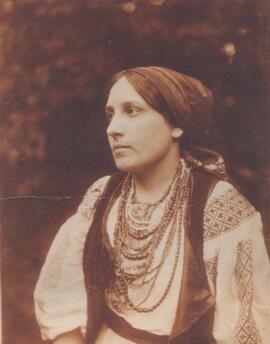The collection consists of three albums of photographs many of which were included in the historical and ethnographic albums "Ivan Honchar: Ukraine and Ukrainians".
Honchar, IvanThe collection consists of assignments for various folklore classes at the University of Alberta including Ukrainian Material Culture (UKR-527), Ukrainian Folk Art and Performance (UKR-528), Rites of Passage (UKR-525), Ukrainian Calendar Customs (UKR-526), Ukrainian Folk Songs (UKR-522), Ukrainian Folk Prose (UKR-523), and Ukrainian Folklore in Canada (UKR-532).
The collection includes the following projects:
- Poias for the Babies
- Bunica's Funeral Dinner: The China
- A Kuzhil' [Distaff] Among Flowers
- "Yuriy Fedkowych Ukrainian Educational Society of Soda Lake" Proscenium Screen
- Ukrainian Rites of Passage: Silence and Pregnancy
- Iordan, Feast of the Epiphany
- Katie and Christine: Their Kolomyiky
- Wolves and Viagra: Katie and Metro
- Literary Folkloristics and the Personal Narrative by Sandra Dolby Stahl: A Review of the Study
- On Forgetting
Recollections of Ropchan (Rapchan) brothers, as well as indexes and transcripts of interviews conducted by Monica for her dissertation are also part of this collection.
Jensen, MonicaThis collection contains the results of two ethnographic trips to the Ukrainian communities in Brazil by Andriy Nahachewsky. The first trip took place from 4 May to 26 May 2009, and included Andriy Nahachewsky, Serge Cipko, John C. Lehr, and Maryna Hrymych. This was the first trip to Brazil for each of the participants, though they each had strong credentials in their disciplines and in fieldwork more generally. Thus the project goal was to cast a wide net for general orientation into the historical and contemporary life of the Ukrainian communities there. Each researcher also had specific personal goals. The trip included visits to Curitiba, Prudentópolis and several rural communities nearby, Craveiro in Santa Catarina, São Paulo, Brasília, and Foz do Iguaçu. The agenda included visits to an agricultural cooperative, meetings with diplomats and organizational representatives, and diverse individuals who could speak about life in their communities. Photographs by Hrymych, Lehr, and Cipko are also accessioned into the BMUFA and located in their own respective collections.
The second trip was undertaken by Andriy Nahachewsky, for 6 months from 14 November 2009 to 13 May 2010. The goal of the project was to continue the first exploratory fieldtrip, intensifying and expanding it. The project had a strong diachronic focus, documenting change in cultural traditions, to understand better how Ukrainian cultural content, rooted in 19th century rural traditions in western Ukraine, became transplanted, disappeared, adapted, and sometimes newly created in its diaspora setting in the Brazilian context. The intent was to be able to compare these processes with similar ones known from the Ukrainian Canadian context, as well as culture in western Ukraine itself, which also changed significantly over the 20th century: One cultural root, and three branches evolving on three continents over 120 years.
Another aspect of the fieldtrip was connected with Nahachewsky’s earlier “Local Culture and Diversity on the Prairies” project, which strove to provide documentation about regional differences in traditional Ukrainian culture in the Canadian setting. This аspect of the project was to try trace local differences in Brazilian culture in a similar way. Some of these regional differences were probably most clear in past decades. A third aspect was more synchronic, aimed to document contemporary life. Connected with this, the Brazil trip involved travelling to some 65 communities in the states of Paraná, Santa Catarina, Rio de Janeiro, and São Paulo, the main Ukrainian settlement areas in Brazil. The project involved recording some 300 audio interviews, 53 hours of video recordings of contemporary events, 14,000 photographs, and gathering many publications and manuscripts (in hard copy and reproduced digitally), as well as diverse artifacts. The overall focus in subject matter was broad, including material culture (farming practices, folk arts), customs (calendar holidays, weddings, funerals, etc) and performing arts (music, dance). Special foci developed for dance materials, religious images, church architecture, cemeteries, music, and weddings, because of Nahachewsky’s research background, opportunities, and experiences as the fieldwork proceeded. The trips were both funded by the Huculak Chair and the Kule Folklore Centre (for the first trip: Nahachewsky, Hrymych, and various shared expenses). During both trips, the hosts in the home base in Prudentópolis, as well as other locations in Brazil, were very warm and hospitable, open, and generous. A copy of the digital photo, audio, and video fieldwork materials was deposited in the Museu do Milênio in Prudentópolis.
Nahachewsky, AndriyA collection of records of Elsie Kawulych family, correspondence with relatives in Ukraine, Argentina and Brazil, photographs, phonograph records, ethnic clothing, posters, and an interview with Elsie Kawulych (recorded on August 7, 2014).
Kawulych, Elsie